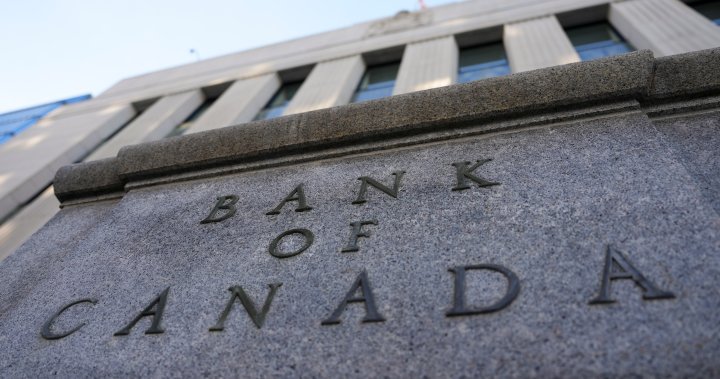The economic impact of U.S. President Donald Trump’s tariffs will be in focus as the Bank of Canada is set to announce its overnight interest rate Wednesday.
Some analysts expect the central bank to cut its benchmark rate by 25 basis points, bringing it down to 2.5 per cent. Others expect the bank to hold the rate steady.
A cut would make it the eighth consecutive rate cut by the Bank of Canada.
The Royal Bank of Canada expects the overnight rate to be cut by 25 basis points.
“Our forecast for the Canadian economy this year has weakened since March. Tariffs are still expected to hurt Canadian exporters but concerns have also grown around a substantially softer U.S. outlook due to reciprocal tariffs and how that can spill over to impact Canada,” RBC economist Abbey Xu said in a note Tuesday.
Overall inflation eased for Canadians in March, but the end of the GST/HST holiday and Trump’s trade war continues to stress consumers in Canada. Statistics Canada said Tuesday that the annual pace of inflation cooled to 2.3 per cent in March, compared to 2.6 per cent the month before.

Get breaking National news
For news impacting Canada and around the world, sign up for breaking news alerts delivered directly to you when they happen.
CIBC economist Katherine Judge said, “The easing in price pressures is consistent with the Bank of Canada cutting interest rates by 25bps at tomorrow’s meeting, with the downside risks to growth from the trade war outweighing any upside to inflation from tariffs in our view.”

Other economists, however, are pointing to the possibility of the bank holding the rate steady at 2.75 per cent.
“If trade tensions continue to escalate, we’re looking at the risk of a stagflationary environment with slower growth and rising prices. With so much uncertainty around global growth—especially with tariffs introduced by the U.S.—we expect the Bank to hold rates steady at tomorrow’s meeting,” Andrew DiCapua, principal economist at the Canadian Chamber of Commerce said.
Bank of Canada governor Tiff Macklem said last month that while Canada’s economy had entered 2025 on “solid footing,” with inflation remaining close to the bank’s two per cent target rate since last summer, Trump’s tariffs pose a new challenge.
“In recent months, the pervasive uncertainty created by continuously changing U.S. tariff threats has shaken business and consumer confidence. This is restraining household spending intentions and businesses’ plans to hire and invest,” Macklem said.
Macklem added that the trade conflict with the United States is likely to increase inflation in the coming months.
“Businesses have lowered their sales outlooks, notably in manufacturing and in sectors that depend on discretionary spending by households,” he said.
“Credit has become more difficult to access for some businesses, and with a weaker Canadian dollar, the cost of imported machinery and equipment has risen. As a result of all these trade-related factors, many businesses have scaled back their hiring and investment plans.”
When asked if Canada was staring down the barrel of a recession, Macklem said, “It’s going to depend a lot what the U.S. does with their trade policy.”
© 2025 Global News, a division of Corus Entertainment Inc.






